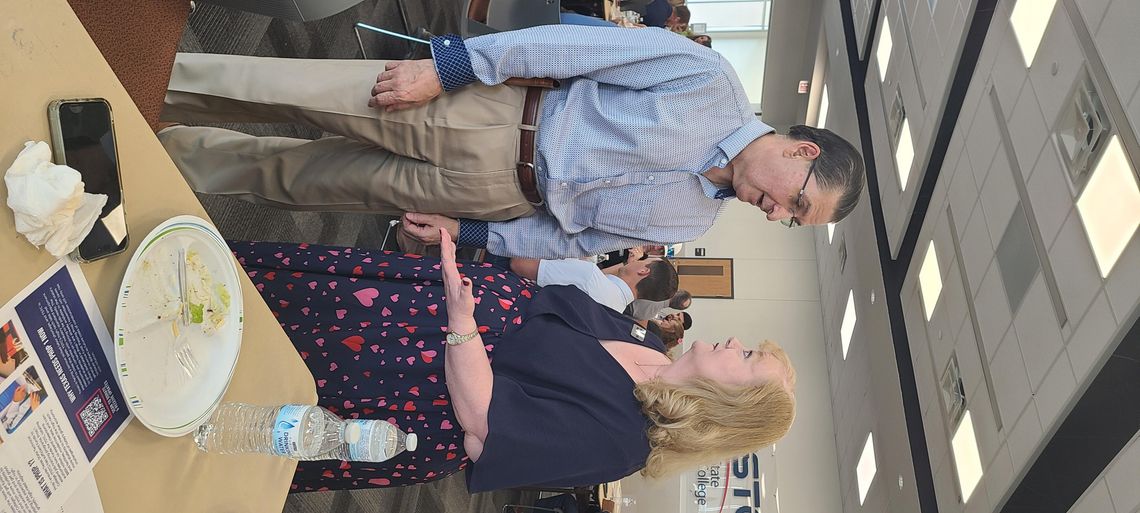Office personnel will begin filling the new Samsung Austin Semiconductor campus in Taylor next month, according to Michele Glaze, senior director of communications and community affairs.
Glaze spoke about the current status of the $17 billion facility at a Hutto Area Chamber of Commerce luncheon Oct.8. The monthly luncheon was held at the East Williamson County Higher Education Center, 1600 Innovation Blvd. in Hutto.
Glaze said the company expects the fabrication plant to be operational by the end of 2026.
“We have a strong and aggressive timeline for our fab,” she said, adding that due to client confidentiality they would not be able to announce the exact date they would start production.
Tesla, Inc. announced earlier this year they would be the first major client for the fabrication facility, signing a $16.5 billion deal for Samsung to manufacture next-generation chips for the automaker.
Samsung expects to locate about 1,000 workers in the Taylor facility in its first two quarters. Employees will discover amenities similar to the Austin location, with a fitness center, atriums, cafeterias, a meditation space, a lazy river, a water fountain in the shape of Texas and more than 125 trees planted around the office area.
In addition to the six-story office building and the fabrication plant, the facility has its own utility station, electrical substation, water and wastewater facilities, two chemical supply buildings, three warehouses, two water tanks, 250 construction trailers and other structures needed to support the employees, administration and production facilities.
There will be enough water stored in tanks to carry the facility through up to six days of production in case of water shortage due to severe weather, as happened to the Austin facility in 2021 with Winter Storm Uri.
To get to this point, Glaze said more than 40,000 individual workers have put in nearly 70 million work hours, pouring more than three billion pounds of concrete and moving 32 million cubic feet of dirt. She expects Samsung to have more than 4,500 employees supporting the Taylor facility.
Glaze took the opportunity to encourage the crowd to vote yes for Proposition One in the upcoming November election. Proponents say Prop 1 will help Texas State Technical College increase its ability to train students for jobs in advanced manufacturing, including working for Samsung.
TSTC has expansion projects at seven of its 11 campuses statewide. The Hutto campus will add a 70,635-square foot building that is expected to triple the enrollment of students in manufacturing programs when it opens in 2027.
Kendal Carrillo, vice president and senior advisor to the Chancellor of TSTC, said the school does not have a dedicated funding source for infrastructure and capital projects, so it has to ask the state legislature for money every two years. If it passes, Prop 1 would take $850 million of money the state has already collected and put it in an investment fund controlled by the comptroller. The fund would generate about $50 million a year in interest, which would be allocated specifically to TSTC buildings, equipment and training programs.
The $850 million seed money would come from already collected funds, Carrillo said Prop 1 would not cost taxpayers any additional money.
“We’re growing our current footprint on the campuses we have. That’s really important because of the amount of business that’s being attracted to Texas and hopefully staying in Texas,” Carrillo said.
As a government employee, Carrillo was careful to point out he cannot advocate for passing the proposition.
Samsung has development agreements to eventually build up to nine more fabrication factories in the area by 2040, depending on the demand for the chips and the geopolitical factors that affect international businesses, according to Glaze. The plants would depend on the availability of a steady supply of qualified workers.
“We are excited that the new advanced manufacturing center that’s being built is going to help expand the talent pipeline and keep up with the semiconductor industry growth,” Glaze said. She explained that advanced manufacturing does not depend on people building products on an assembly line but instead on highly-skilled people running tools and systems.
“Once you build a manufacturing facility it’s not going to go away because we will continue to put in new tools as industry evolves and technology evolves. That is the beauty of those tools,” she said.
There are 17 propositions on the Nov. 4 ballot. The TSTC funding proposition is the first one on the ballot. Early voting is from Oct. 20-31.








